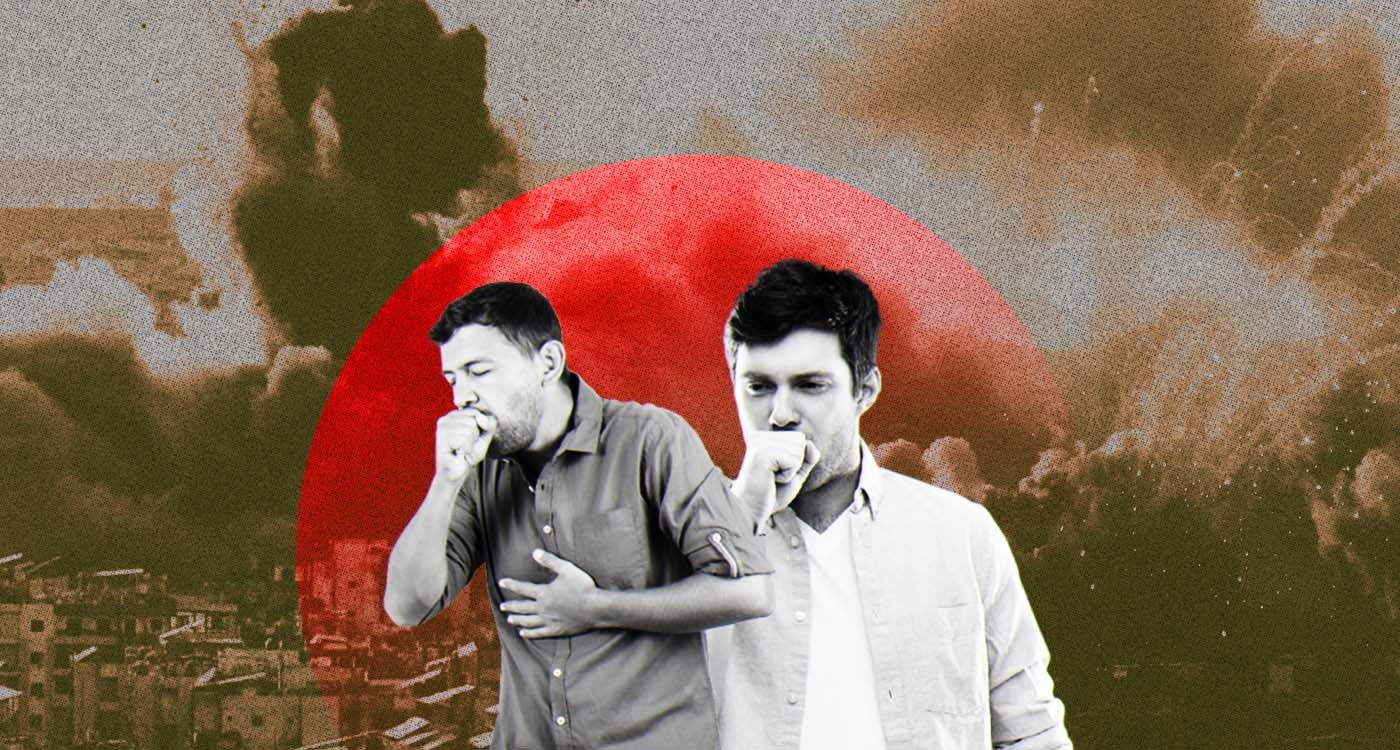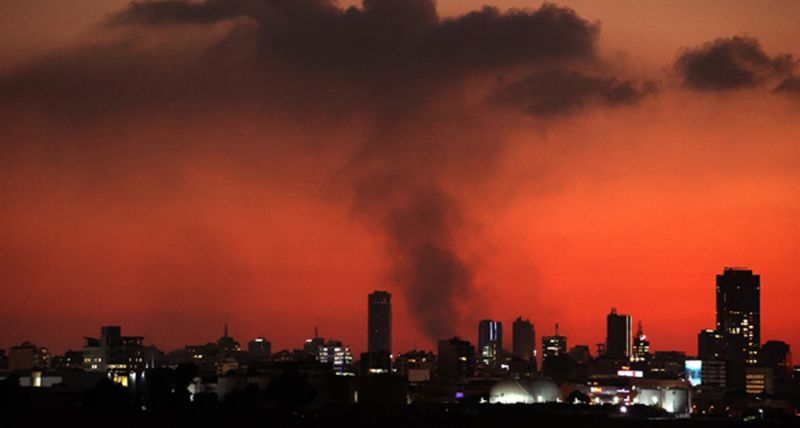
An Israeli raid bombards Beirut’s southern suburbs by night. Dark smoke engulfs the region, spreading until dawn, and suffocating the Lebanese.
Since September, Israeli raids have targeted Lebanese territory almost daily, leaving behind a dense cloud of smoke for people to inhale. Combined with existing pollution from Lebanon’s overreliance on generators, the smoke is slowly endangering the health of the Lebanese population.
Breathless in Beirut
Manal lives in Ain El Remmaneh, a suburb of Beirut. Although the area is a few kilometers away from Dahyeh, she can smell burning when she opens her windows in the morning. The smoke has severely impacted her health.
“I’ve seen a pulmonologist three times in the past three weeks because I can’t stop coughing,” she told This is Beirut.
Manal, who suffers from allergies, was diagnosed with acute respiratory tract inflammation due to frequent smoke inhalation.
“We have to keep the windows open at all times in case of a close raid,” she lamented. “We can only close the windows briefly before receiving alerts from the Israeli army about new attacks on Beirut’s southern suburbs.”
Her allergies were recently exacerbated when she inspected her relative’s damaged property in Chiah after a raid.
She abstains from wearing a mask indoors, going against her doctor’s request. She admits she dislikes the feeling and has “gotten used to the smoke-filled air.”
On October 8, Israeli warplanes carried out a total of 14 raids on the southern suburbs of Beirut, causing cases of suffocation among residents due to the foul odors emanating from the bombing sites.
The Israeli army is reportedly using white phosphorus, which can cause severe health issues if inhaled. Alarmingly, there is also speculation about the possible use of uranium by the Israeli army.

Smoke billows from Beirut’s southern suburb following an Israeli bombing on November 12, 2024. Photo Credit: AFP
The Pollutants and Their Effects
To understand the health consequences of inhaling these chemical substances, This is Beirut spoke with Dr. Celine Baaklini, Chief of the Pulmonary-Intensive Care Unit at Bellevue Medical Center (BMC).
“In the short term, symptoms from smoke inhalation include skin allergic reactions such as rashes, bronchial hyperreactivity, suffocation, dyspnea (shortness of breath), difficulty breathing, respiratory infections, and eye redness,” stated Dr. Baaklini.
She explains that the long-term risks of developing cancer, chronic bronchitis, chronic respiratory failure, and oxygen dependency are higher for those who have been exposed to smoke.
Inhalation of uranium is notably linked to leukemia (blood cancer), among other cancers. White phosphorus inhalation can cause Chronic Obstructive Pulmonary Disease (COPD), a chronic lung condition caused by damage to the lungs, as well as asthma attacks.
White phosphorus is a highly reactive compound that ignites instantly when exposed to air and burns at extremely high temperatures, while uranium is a critical component used in nuclear fuel production for reactors worldwide.
People with chronic diseases, COPD, and asthma are the most affected by these pollutants. COPD and asthma attacks can cause suffocation and can be fatal.
While no relevant studies exist on the issue, doctors speculate that the levels of asthma and lung diseases in Beirut have skyrocketed in the last four years due to the burning of trash and reliance on generators. This is evident in the increase in the number of patients being treated for lung diseases in recent years.
“Patients with pulmonary diseases have increased by 40-50% across Lebanon,” stated Dr. Baaklini.
Fine Particles and Rainfall
Due to Israeli raids, a large cloud of smoke can be observed over the southern suburbs of Beirut.
Fine particle pollution from outdoor sources includes vehicle exhaust, burning wood, gas, other fuels, and fires. Upon inhalation, these particles can cause health problems. In Beirut, generators are the primary contributors to particle pollution, with an estimated 8,000 diesel generators powering the capital since the 2019 economic collapse.
According to recent research conducted by the American University of Beirut, the average annual level of fine particle pollution—particles of 2.5 micrometers or less—in Beirut is 17.2 micrograms per cubic meter, more than three times the World Health Organization’s recommended limit of 5 micrograms per cubic meter.
These particles, exacerbated by the constant raids on Beirut, will worsen during rainfall.
“These particles will come down when the rain falls. They will reach our hair, clothes, food, etc., increasing health risks,” says Dr. Baaklini.
Non-ventilated areas, especially densely populated urban regions, are at the highest risk because outdoor particle pollution levels are more likely to be elevated on days with little or no wind or air mixing.

Smoke rises from the site of an Israeli strike that targeted a neighborhood in Beirut’s southern suburbs on November 12, 2024. Photo Credit: AFP
Preventive Measures
To reduce health risks from inhaling pollutants, Dr. Reda Safieddine, a pulmonologist at BMC, recommends the following precautions:
- Leave affected regions to avoid exposure.
- Stay indoors for at least 24 hours after a raid.
- Wear N95 masks to prevent inhaling dust, especially in polluted areas.
- Shower after visiting affected areas.
- Wear gloves when handling materials in affected areas.
- Avoid visiting bombed areas unless necessary. Time spent should be limited, especially for those with respiratory issues.
- Sprinkle water before touching any materials in affected areas.
- Close windows and cover them with curtains to trap dust.
Dr. Safieddine also warns of the risks associated with self-medicating: “Increase in doses of bronchodilators can make you jittery and anxious and increase the risks of tachycardia,” he added, advising all patients to seek medical assistance before taking any medication.
As Beirut’s skies grow darker with smoke, the city stands on the brink of a silent public health disaster. How long can the Lebanese people hold their breath?




Comments